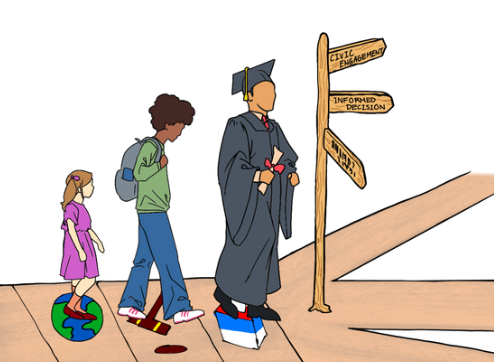Written by Elinor Aspegren
The Palo Alto High School (Paly) Rally has been a tradition at Gunn for as long as most students can remember. For many senior boys, it is the best time of the year. This year, however, the best time of the year is no more; the administration decided that the Student Executive Council (SEC) will not be allowed to provide a platform for the “Paly cheerleaders” to perform. According to a message sent out by the SEC, the revised school board policy on sexual harassment, nondiscrimination and bullying required that these changes be made. For these reasons, abolishing Paly Rally is justified. Making the decision without compromise and without student input, however, is not.
One of the many arguments from those who support Paly Rally is that it’s just a fun tradition. They say that the admin “must be really triggered” and complain that “we are so po- litically correct now.” These comments aren’t just wrong, but they’re downright disrespectful.
In order to understand why Paly rally cannot be considered a fun tradition, one needs to understand the double standard of dress. This concept refers to the unwritten code of sexual behavior permitting men more freedom than women. This sexual behavior isn’t always what people think, however—it also applies to what people wear. A couple years ago, the audience was flashed by the Paly cheerleaders. Yet these outfits were still allowed in following years. In contrast, the Titanettes had to cover their shoulders for the Night Rally because even that was deemed too distracting.
This message not only is unfair, but sends the idea to girls that they are not allowed to wear what they want to school, while guys have the freedom to do so. Allowing a dress code violation for guys but not for girls promotes a disparity between girls and guys that ultimately ends up marginalizing girls in the future. Not only that, but dressing like a girl and imitating the Paly cheerleaders, most or all of whom are girls, is violat- ing the board policy’s clause on sexual harassment. For every boy who participates in this rally, there’s a girl who has been sexually harassed in her lifetime who sees it and remembers it.
The problem with this decision is not what it does, but rather what it represents. Throughout the past two semesters, adminis- trators have been emphasizing the importance of dialogue and communication between students and staff. There have been several forums between students and staff, a Student Senate and several committees all to preserve student voice. In the words of Superintendent Dr. Max McGee, “We can do better. We will do better.”
But the Paly Rally decision seems to debunk all of the aims of this initiative. Students are supposed to be involved in the decision-making, but this doesn’t mean just the decision- making that affects our schedule or our mental wellness. It’s also the decision making that affects our spirit and our daily lives at Gunn.
In late January, the SEC proposed a modification to the Paly Rally senior boys’ dance routine. The decision entailed the boys wearing a dress code-abiding outfit and the dance routine being choreographed by the cheer team. Yet, even with this compromise, the administration came to a final decision all by themselves. The SEC, however, is the one that runs the rally—they’re the ones that need to have jurisdiction over it as well. After all, it’s the Student Executive Council, not the Admin Executive Council.
This decision permeates the belief that the administration do not trust us enough to make this decision on our own. Perhaps, if SEC had come to this decision—which, if given another week, they certainly would have—people would have caused less uproar about it. Instead, someone is getting blamed, and it isn’t those who put on the dance in the first place.
Over these past few semesters, students, staff and adminis- tration have tried to make decisions that reflect unity between the staff, students and administration. This school unity, how- ever, cannot be achieved without administration listening to the students.









